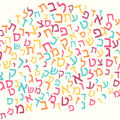 You Know More Hebrew Words Than You Think
You Know More Hebrew Words Than You Think
4 min read
I have heard that there are some Jews who do not consider turkey kosher. Can you tell me the reason for this? As far as I know, turkey with kosher certification is widely available.
I personally do not know anyone who does not eat turkey, but in truth, the burden of proof lies on the rest of us who do. Here is the basic issue.
Unlike animals and fish, for which the Torah gives specific signs for determining their kashrut (i.e., animals which have split hooves and chew their cud and fish which have fins and scales), the Torah simply lists 24 species of birds which are not kosher (Leviticus 11:13-19 & Deut. 14:12-18). The implication is that the vast majority of the birds of the world are kosher; only a limited number of exceptions exist.
Over the years the exact identity of the non-kosher birds listed in the Torah has become lost. Thus, nowadays we are not able to determine the kashrut of a given bird simply by checking if it appears in the Torah’s forbidden list.
The Mishna (Chullin 3:6) does provide a set of criteria for determining if a bird is kosher. The rules are that all birds of prey (lit., “which pounce”) are forbidden. Kosher birds have an extra toe (facing the opposite direction of the others), a crop, and a gizzard which can be easily peeled.
There is much rabbinic discussion regarding the precise meaning of these criteria – especially of the definition of a “pouncing” bird. As a result, the accepted practice is not to rely on the criteria at all, but to eat only birds for which we have a tradition, handed down throughout the generations, that they are kosher (Rema Y.D. 82:3).
If so, the status of turkey comes under question. Turkeys are native to the New World. (There was even a proposal to make it the national bird of the United States.) Although they do appear to have all the signs the Mishna lists, we cannot possibly have a tradition from generations past that it is kosher. So why do Jews (almost) universally eat it?
Several suggestions have been made. One is that interestingly, the Jews of Europe almost universally began eating turkey once it became available from the Americas. After the fact, the question was posed to various rabbis. (Many mistakenly thought it was imported from India – as even today in Hebrew the turkey is called a “tarnegol hodu” – Indian chicken. They likewise believed that Indian Jews had an established tradition that it is kosher.) Thus, many rabbis accepted that since it does have all the required signs and people have already accepted it as kosher, we have no grounds to forbid it due to a lack of a tradition. In other words, a tradition is required to permit the forbidden, but the lack of a tradition is not grounds to forbid that which has already been assumed to be permitted (Netziv, Meishiv Davar YD:22).
Some also suggest that Jews began eating turkey before the custom became established (late 16th century) not to eat any bird without a tradition. Thus, the later practice not to accept new birds did not come into effect for the turkey.
A final possible justification is that it is possible to cross-breed turkeys and chickens and create a viable hybrid. This too is a possible means of verifying that a questionable species is considered a “cousin” of an accepted one.
(Basic material for response drawn from article by Rabbi Ari Zivotofsky, Journal of Halacha and Contemporary Society, #XXXV.)
Click here to comment on this article
The Shaloh Hakadosh (Rabbi Isaiah Halevi Horowitz) once saw a turkey behaving like a wild beast. He declared that he does not want his descendants eat from this fowl. (perhaps the concept of You are what you eat?) Many of his descendants refrain from eating turkey even nowadays. (Most Jews with the last name Horowitz or various variants of the name are descendants of the Shaloh.)